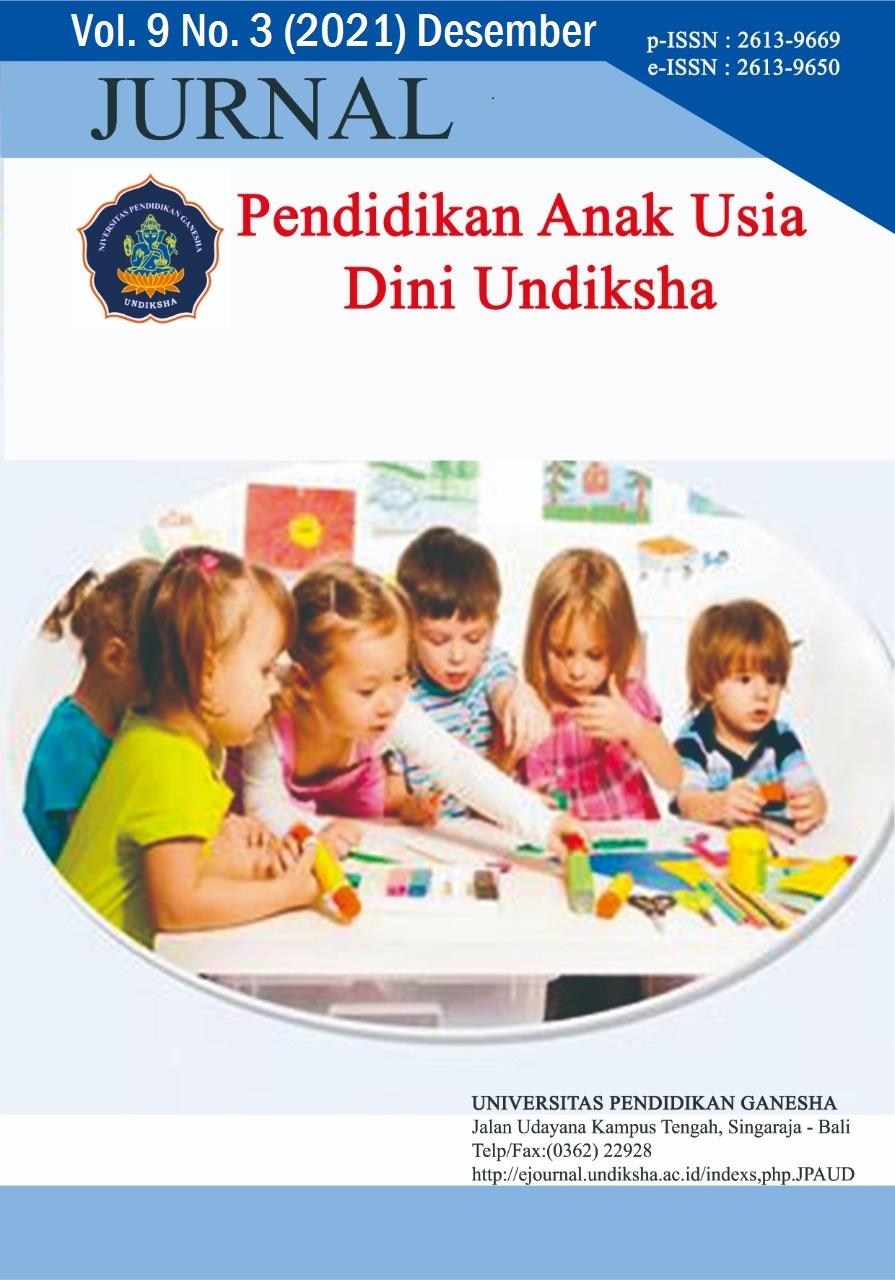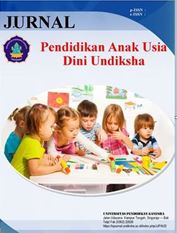Transformasi Lingkungan Pembelajaran Berbasis Literasi Digital Pada Anak Usia Dini
DOI:
https://doi.org/10.23887/paud.v9i3.38491Keywords:
Literasi Digital, Pembelajaran OnlineAbstract
Penelitian ini dilatarbelakangi karena masalah atas kekhawatiran guru untuk meminimalkan resiko bahaya online pada anak usia dini. Selain itu, peran orang tua yang masih belum maksimal dalam pendampingan belajar virtual anak dalam penggunaan internet yang bemakna. Tujuan penelitian untuk mengetahui sejauhmana kemampuan anak usia dini dalam beradaptasi dengan lingkungan pembelajaran berbasis literasi digital. Metodologi penelitian yang digunakan kualitatif deskriptif, metode pengambilan data dengan observasi dan wawancara dengan pedoman pada tiga aspek penting pengukuran, yaitu: dukungan media sosial, kondisi jaringan atau akses, dan peningkatan hasil akademik selama anak belajar online. Subjek penelitian diambil secara random sampling, yaitu: empat orang tua siswa. Analisis data dilakukan dengan triangulasi sumber data untuk menggali kebenaran infromasi tertentu. Sedangkan desain penelitian berdasarkan pendekatan Miles dan Hubermen, yaitu: reduksi data, penyajian data, dan penarikan kesimpulan/verifikasi. Hasil menunjukkan bahwa literasi digital masih belum banyak di bahas dan penting untuk ditanamkan pada anak usia dini, memperkenalkan bagaimana transformasi lingkungan pembelajaran pada masa pandemic saat ini. Beralih dari lingkungan tatap muka di kelas menjadi lingkungan pembelajaran online. Melalui dukungan media sosial, guru dapat memvariasikan pembelajaran untuk menarik perhatian anak PAUD. Selain akses jaringan yang mempengaruhi, guru dan orang tua termasuk komponen penting agar anak terawasi sehingga tidak menyalahgunakan dalam pembelajaran online. Dukungan guru dan orang tua, serta akses dalam menunjang transformasi lingkungan pembelajaran berbasis literasi digital sebagai alternatif baru yang dapat pula meningkatkan hasil akademik siswa melalui lingkungan pembelajaran online.
References
Aeni, K., Widhanarto, G. P., & Astuti, T. (2020). Strengthening character education in elementary schools: Learning technology in school culture. International Journal of Scientific and Technology Research, 9(2), 898–902.
Al Lily, A. E., Ismail, A. F., Abunasser, F. M., & Alhajhoj Alqahtani, R. H. (2020). Distance education as a response to pandemics: Coronavirus and Arab culture. Technology in Society. https://doi.org/10.1016/j.techsoc.2020.101317
Alwi, S. (2017). Problematika guru dalam pengembangan media pembelajaran. Itqan, 8(2), 145–167. http://ejurnal.iainlhokseumawe.ac.id/index.php/itqan/article/download/107/65/
Asok, D., Abirami, A. M., Angeline CV, N., & Lavanya, R. (2017). Active learning environment for achieving higher-order thinking skills in engineering education. Proceedings - 2016 IEEE 4th International Conference on MOOCs, Innovation and Technology in Education, MITE 2016, August 2020, 47–53. https://doi.org/10.1109/MITE.2016.69
Azzahra, N. F., & Amanta, F. (2019). Policy Brief No. 11 Promoting Digital Literacy Skill for Students through Improved School Curriculum. Center for Indonesian Policy Studies, 1(11), 14.
Badan Pusat Statistika. (2020). Statistik Indonesia 2020 Statistical Yearbook of Indonesia 2020. Statistical Yearbook of Indonesia, April, 192.
Bakr, A. F., El Sayad, Z. T., & Thomas, S. M. S. (2018). Virtual reality as a tool for children’s participation in kindergarten design process. Alexandria Engineering Journal, 57(4), 3851–3861. https://doi.org/10.1016/j.aej.2018.10.003
Becker, K. L., & Renger, R. (2017). Suggested Guidelines for Writing Reflective Case Narratives : Structure and Indicators. https://doi.org/10.1177/1098214016664025
Bhatti, Z., Abro, A., & Karbasi, M. (2017). Be-Educated: Multimedia Learning through 3D Animation. 1(December), 13–22.
Bliss, A. C. (2019). Adult Science-Based Learning. XX(X). https://doi.org/10.1177/1045159519829042
Bucchi, M., & Saracino, B. (2016). “ Visual Science Literacy ”: Images and Public Understanding of Science in the Digital Age. https://doi.org/10.1177/1075547016677833
Chen, C. Y., Kao, C. C., Hsu, H. Y., Wang, R. H., & Hsu, S. H. (2015). The Efficacy of a Family-Based Intervention Program on Childhood Obesity: A Quasi-Experimental Design. Biological Research for Nursing, 17(5), 510–520. https://doi.org/10.1177/1099800414565815
Chen, J. qi, & Chang, C. (2006). Using computers in early childhood classrooms: Teachers’ attitudes, skills and practices. Journal of Early Childhood Research, 4(2), 169–188. https://doi.org/10.1177/1476718X06063535
Chen, Y. C. (2019). Using the Science Talk–Writing Heuristic to Build a New Era of Scientific Literacy. Reading Teacher, 73(1), 51–64. https://doi.org/10.1002/trtr.1808
Dionisio, J. D. N., Burns, W. G., & Gilbert, R. (2013). 3D virtual worlds and the metaverse: Current status and future possibilities. ACM Computing Surveys, 45(3). https://doi.org/10.1145/2480741.2480751
Efendii, R., Jamba, I., & Alfarissi. (2020). Media Pembelajaran Berbasis Video Animasi Untuk Pembelajaran Jarak Jauh. Jurnal Pengabdian Sriwijaya, May, 1016–1021.
Golumbic, Y. N., Fishbain, B., & Baram-Tsabari, A. (2020). Science literacy in action: understanding scientific data presented in a citizen science platform by non-expert adults. International Journal of Science Education, Part B: Communication and Public Engagement. https://doi.org/10.1080/21548455.2020.1769877
Grimminger-Seidensticker, E., & Möhwald, A. (2020). Enhancing social cohesion in PE classes within an intercultural learning program: results of a quasi-experimental intervention study. Physical Education and Sport Pedagogy, 25(3), 316–329. https://doi.org/10.1080/17408989.2020.1741532
Hamdu, G. (2018). Pengembangan Lembar Kerja Siswa Berbasis Hots Berdasarkan Taksonomi Bloom Di Sekolah Dasar. PEDADIDAKTIKA: Jurnal Ilmiah Pendidikan Guru Sekolah Dasar, 5(3), 45–58.
Herliandry, L. D., Nurhasanah, Suban, M. E., & Heru, K. (2020). Transformasi Media Pembelajaran Pada Masa Pandemi Covid-19. Jurnal Teknologi Pendidikan, 22(1), 65–70. http://journal.unj.ac.id/unj/index.php/jtp
Iftakhar Shampa. (2016). Google classroom: What works and how? Journal of Education and Social Sciences, 3, 12–18.
Johnson, S. K., Buckingham, M. H., Morris, S. L., Suzuki, S., Weiner, M. B., Hershberg, R. M., Fremont, E. R., Batanova, M., Aymong, C. C., Hunter, C. J., Bowers, E. P., Lerner, J. V., & Lerner, R. M. (2016). Adolescents’ Character Role Models: Exploring Who Young People Look Up to as Examples of How to Be a Good Person. Research in Human Development, 13(2), 126–141. https://doi.org/10.1080/15427609.2016.1164552
Kostolitz, A. C., Hyman, S. M., & Gold, S. N. (n.d.). Journal of Child Sexual Abuse How Ineffective Family Environments Can Compound Maldevelopment of Critical Thinking Skills in Childhood Abuse Survivors. December 2014, 37–41. https://doi.org/10.1080/10538712.2014.931318
Lin, M. H., Chen, H. C., & Liu, K. S. (2017). A study of the effects of digital learning on learning motivation and learning outcome. Eurasia Journal of Mathematics, Science and Technology Education, 13(7), 3553–3564. https://doi.org/10.12973/eurasia.2017.00744a
Maimunah, Aslamiah, & Suriansyah, A. (2018). The Integration of Sentra-Based Learning and Involvement of Family Program at Early Childhood in Developing Character Building (Multi Case at PAUD Mawaddah and PAUD Alam Berbasis Karakter Sayang Ibu Banjarmasin, Indonesia). European Journal of Education Studies, 5(7), 49–63. https://doi.org/10.5281/zenodo.1494207
Mishra, L., Gupta, T., & Shree, A. (2020). Online teaching-learning in higher education during lockdown period of COVID-19 pandemic. International Journal of Educational Research Open, 1, 100012. https://doi.org/10.1016/j.ijedro.2020.100012
Mongey, S., & Weinberg, A. (2020). Characteristics of Workers in Low Work-From-Home and High Personal-Proximity Occupations. Bfi.Uchicago.Edu, March.
Park, Y. (2019). DQ Global Standards Report 2019 Common Framework for Digital Literacy, Skills and Readiness.
Rapanta, C., Botturi, L., Goodyear, P., Guàrdia, L., & Koole, M. (2020). Online University Teaching During and After the Covid-19 Crisis: Refocusing Teacher Presence and Learning Activity. Postdigital Science and Education, 2(3), 923–945. https://doi.org/10.1007/s42438-020-00155-y
Rasol, R., Syed Mahadi, S. L., Mohd Khalid, F. Z., Azmi, N. S., Syed Aris, S. R., & Abdul Razak, W. R. W. (2020). Performances in English Proficiency Course with Students’ Ability in Answering Higher Order Thinking Skills Questions. Environment-Behaviour Proceedings Journal, 5(SI1), 157–162. https://doi.org/10.21834/ebpj.v5isi1.2314
Ratheeswari, K. (2018). Information Communication Technology in Education. Journal of Applied and Advanced Research, 3(S1), 45. https://doi.org/10.21839/jaar.2018.v3is1.169
Roddy, C., Amiet, D. L., Chung, J., Holt, C., Shaw, L., McKenzie, S., Garivaldis, F., Lodge, J. M., & Mundy, M. E. (2017). Applying Best Practice Online Learning, Teaching, and Support to Intensive Online Environments: An Integrative Review. Frontiers in Education, 2(November), 1–10. https://doi.org/10.3389/feduc.2017.00059
Rowe, C., Watson-Ormond, R., English, L., Rubesin, H., Marshall, A., Linton, K., Amolegbe, A., Agnew-Brune, C., & Eng, E. (2017). Evaluating Art Therapy to Heal the Effects of Trauma Among Refugee Youth: The Burma Art Therapy Program Evaluation. Health Promotion Practice, 18(1), 26–33. https://doi.org/10.1177/1524839915626413
Smith, V., & Darvas, J. (2017). Encouraging Student Autonomy Through Higher Order Thinking Skills. Journal of Instructional Research, 6(1), 29–34. https://doi.org/10.9743/jir.2017.5
Sood, R., & Xiao, H. (2018). Pulse shapes with reduced interference via optimal band-limited functions. 2006 International Waveform Diversity and Design Conference, WDD 2006 - Proceedings, 2018-Janua(2), 1–6. https://doi.org/10.1109/WDD.2006.8321485
Tavangarian, D., Leypold, M., Nölting, K., Röser, M., & Voigt, D. (2004). Is e-Learning the Solution for Individual Learning?. Electronic Journal of E-Learning, 2(2), 273–280.
Unger, S., & Meiran, W. (2020). Student Attitudes Towards Online Education during the COVID-19 Viral Outbreak of 2020: Distance Learning in a Time of Social Distance. International Journal of Technology in Education and Science, 4(4), 256–266. https://doi.org/10.46328/ijtes.v4i4.107
Wiegand-Grefe, S., Sell, M., Filter, B., & Plass-Christl, A. (2019). Family functioning and psychological health of children with mentally ill parents. International Journal of Environmental Research and Public Health, 16(7). https://doi.org/10.3390/ijerph16071278
Yafie, E., Nirmala, B., Kurniawaty, L., Bakri, T. S. M., Hani, A. B., & Setyaningsih, D. (2020). Supporting cognitive development through multimedia learning and scientific approach: An experimental study in preschool. Universal Journal of Educational Research, 8(11 C), 113–123. https://doi.org/10.13189/ujer.2020.082313
Yu, R., & Singh, K. (2018). Teacher support, instructional practices, student motivation, and mathematics achievement in high school. Journal of Educational Research, 111(1), 81–94. https://doi.org/10.1080/00220671.2016.1204260
Yuhanna, I., Alexander, A., & Kachik, A. (2020). Advantages and disadvantages of Online Learning. Journal Educational Verkenning, 1(2), 13–19. https://doi.org/10.48173/jev.v1i2.54
Yustika, G. P., & Iswati, S. (2020). Digital Literacy in Formal Online Education: A Short Review. Dinamika Pendidikan, 15(1), 66–76. https://doi.org/10.15294/dp.v15i1.23779
Zhao, P., Kynäshlahti, H., & Sintonen, S. (2018). A qualitative analysis of the digital literacy of arts education teachers in Chinese junior high and high schools. Journal of Librarianship and Information Science, 50(1), 77–87. https://doi.org/10.1177/0961000616658341
Zukhairina, Wujiati, Sari, S. R., Yennizar, Zulqarnain, & Pujiarto, P. (2020). Parenting practices of early childhood education teachers in developing early childhood communication and critical thinking skills: Case studies. Journal of Critical Reviews, 7(7), 125–132. https://doi.org/10.31838/jcr.07.07.20
Downloads
Published
How to Cite
Issue
Section
License
Authors who publish with the Jurnal Pendidikan Anak Usia Dini Undiksha agree to the following terms:
- Authors retain copyright and grant the journal the right of first publication with the work simultaneously licensed under a Creative Commons Attribution License (CC BY-SA 4.0) that allows others to share the work with an acknowledgment of the work's authorship and initial publication in this journal.
- Authors are able to enter into separate, additional contractual arrangements for the non-exclusive distribution of the journal's published version of the work (e.g., post it to an institutional repository or publish it in a book), with an acknowledgment of its initial publication in this journal.
- Authors are permitted and encouraged to post their work online (e.g., in institutional repositories or on their website) prior to and during the submission process, as it can lead to productive exchanges, as well as earlier and greater citation of published work. (See The Effect of Open Access)












